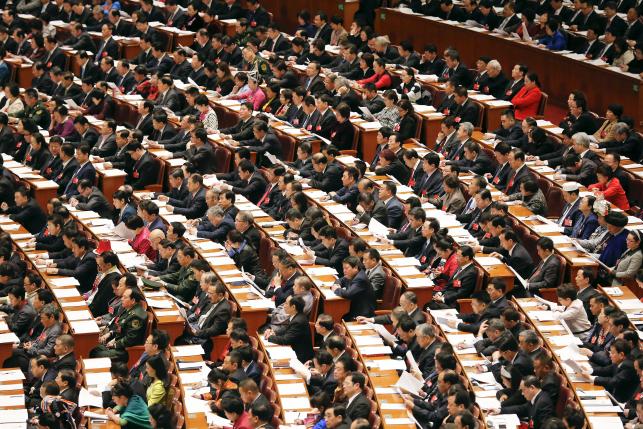Lawmakers approved a new charity law on March 16, the closing day of China’s top national legislative meetings in Beijing. The new legislation becomes the only major law to be passed at the 2016 “Two Sessions.” Xinhua reports:
China’s national lawmakers on Wednesday approved the charity law with 2,636 affirmative votes, 92.49 percent of the total.
The new law, adopted at the annual legislative session and to take effect in September, eases restrictions on fundraising and operations of charity groups, promises tax benefits for charitable activities, and tightens scrutiny on their internal management.
The law stipulates how charities should be registered, giving approved charities more freedom in their operations.
Currently only a few charities are allowed to raise money. [Source]
The Wall Street Journal’s Josh Chin surveys legal analysts’ comments on the new law’s potential to better protect organizations and encourage charitable giving—and also on resistance the law could meet from local officials:
Experts say the law does several things that, theoretically at least, could uncork an expansion of civil society. It smooths the way for nonprofit groups to legally register and raise funds, but it also makes it legal for groups to exist even without registering. At the same time, it encourages more giving by improving tax incentives and making it easier for the wealthy to establish charitable trusts.
Crucially, according to Edward Cunningham, a scholar at Harvard University who runs an ongoing project looking at Chinese philanthropy, the law doesn’t limit the number of nonprofit groups that can work in any one area — a tactic some governments use to keep civil society fragmented.
“From the philanthropy side and public policy side, it’s very well written,” Mr. Cunningham said, referring to a draft of the law made public in October. Experts said they didn’t expect major changes in the final version, the text of which wasn’t immediately available.
[…] Yet, the law could run into resistance, particularly from local government officials who don’t understand or are suspicious of charitable activities, scholars say. At the most basic level, many local tax authorities don’t understand how to process donations and tax deductions, according to Mr. Cunningham. With Mr. Xi pressing an aggressive anticorruption campaign, many local officials are also afraid to be seen as being too cozy with wealthy donors. [Source]
The Xi administration is engaged in an ongoing crackdown on civil society that has seen many activists detained or intimidated by authorities.
At The Diplomat, Shannon Tiezzi provides background on China’s low donation rate, a trend the new law hopes to address:
Why the discrepancy between China’s economic clout and its charitable donations? According to CAF’s finding, it’s likely not due to China’s status as a developing nation. CAF argues that charitable giving has little to do with overall economic prosperity or per capita income; Myanmar, in fact, claimed first place in the 2015 World Giving Index. “Some of the world’s most generous countries are among the most deprived,” CAF noted in its summary of the report. So why isn’t charitable giving catching on in China?
One reason: thanks to endemic corruption, many Chinese don’t trust charities to put their money to good use. A series of recent scandals served to confirm those fears; the government-affiliated Red Cross Society of China, for instance, has been accused of misusing donations intended to help victims of the 2008 Sichuan earthquake. Another scandal erupted in 2011, when a young woman claiming to work from the RCSC posted pictures of herself enjoying a luxurious lifestyle online. Yet another scandal saw the Henan branch of the Soong Ching Ling Foundation accused of funneling donations to property developers rather than the needy.
Public distrust toward charities reared its head in 2013, when netizens balked over the suggestion that China’s charity law should simply deduct “a certain amount from everyone’s paycheck” as charitable donations. Chinese officials later categorically denounced the idea, which was raised by an NPC representative. But the furor saw netizens voicing their suspicion of government-run charities, especially given their lack of transparency.
Low levels of charitable giving might seem a minor concern, but it has big implications for China’s prized “social stability.” As China struggles to rework its social security systems to provide a safety net for all its citizens, charities can play an invaluable role in filling in the gaps. Meanwhile, charities will be an important part of fulfilling Xi Jinping’s enormously ambitious promise to end poverty in China by 2020. […] [Source]
Prior to the passing of the law, some analysts expressed concern over the draft charity law’s lack of protection for organizations working on human rights issues, as well as its potential to prohibit any organizational activity that “endangers national security”—a nebulous qualification that could allow official action against any group deemed to be a political threat.
A draft Foreign NGO Management law, still under revision, has met consistent criticism for its potential use to silence critics, and for seeking to put overseas organizations under the jurisdiction of the national security apparatus, possibly driving them out of China. For more on the development of philanthropy in China, and how “the situation on the ground is more nuanced than headlines” suggesting an imminent departure of all foreign NGOs from China, see commentary from the Centre for Asian Philanthropy and Society Chief Executive Ruth Shapiro, at the Nikkei Asian Review.








